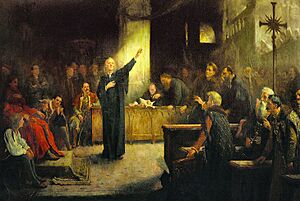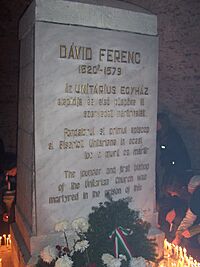Ferenc Dávid facts for kids
Quick facts for kids
Ferenc Dávid
|
|
|---|---|

Ferenc Dávid holding his speech on the Diet of Torda in 1568 (today Turda, Romania) by Aladár Körösfői-Kriesch (1896)
|
|
| Born |
Franz David Hertel
c. 1520 |
| Died | 15 November 1579 (aged c. 58–59) Déva, Principality of Transylvania
(today Deva, Romania) |
| Education | University of Wittenberg University of Frankfurt |
| Known for | Founder of the Unitarian Church of Transylvania |
|
Notable work
|
Rövid Utmutatás az Istennec igeienec igaz ertelmere, mostani szent Haromsagrol tamadot vetélkedesnec meg feytesere es itelesere hasznos es szükseges |
| Title | |
| Spouse(s) | Unidentified (1st) Kata Barát (Münich) (2nd) |
| Children | 4 |
|
Philosophy career |
|
| Era | Protestant Reformation Radical Reformation |
|
Main interests
|
Unitarianism |
|
Influences
Michael Servetus Desiderius Erasmus Roterodamus Giovanni Valentino Gentile Giorgio Biandrata Jacob Palaeologus |
|
|
Influenced
György Enyedi Johann Sommer Johann Sylvan Lelio Sozzini Fausto Sozzini Christian Francken Marcello Squarcialupi Marcin Czechowic Andrzej Wiszowaty Jr. Martin Seidel Wawrzyniec Stegmann Joachim Stegmann |
|
Ferenc Dávid (born around 1520 – died November 15, 1579) was an important religious leader. He was a Protestant preacher and thinker from Transylvania. He started the Unitarian Church of Transylvania. He was a key figure in the Protestant Reformation, a time of big changes in Christian beliefs.
Ferenc Dávid did not agree with the common Christian idea of the Trinity. This idea says that God is three persons: the Father, the Son (Jesus), and the Holy Spirit. Dávid believed that God is one and cannot be divided.
He studied Catholic theology at universities in Wittenberg and Frankfurt. First, he became a Catholic priest. Later, he joined the Lutheran church and then the Calvinist church. He even became a bishop in Transylvania. Throughout his life, Dávid learned about different Christian groups. But he later decided to follow Unitarianism, which focuses on God being one.
Contents
Life of Ferenc Dávid
Early life and education
Ferenc Dávid was born in Kolozsvár, Hungary. Today, this city is called Cluj-Napoca in Romania. His father, David Hertel, was a Transylvanian Saxon who worked with leather. His mother was Hungarian. Ferenc Dávid used the name Francis Davidis or Dávid Ferenc after his father's first name.
He grew up as a Catholic. After finishing high school in Kolozsvár, he went to study in the Holy Roman Empire. He studied Catholic theology at the University of Wittenberg and the Alma Mater Viadrina in Frankfurt.
Joining the Reformation
In 1542, a reformer named Johannes Honterus brought Lutheran ideas to Kolozsvár. When Ferenc Dávid returned to Transylvania, he joined the Lutheran movement. He became a minister and then a Lutheran bishop. He worked as a school principal and a chief pastor in Kolozsvár.
In 1557, the Diet of Torda (a big meeting) made an important rule. It said that people in Transylvania could practice Roman Catholic or Lutheran religions freely. This was an early step towards religious freedom.
Becoming a Calvinist
In 1559, Dávid joined the Reformed Church, also known as Calvinism. He was chosen as a bishop for the Hungarian churches in Transylvania. He also became a special preacher for John II Sigismund Zápolya, the Prince of Transylvania. The prince let him study in the royal library and work on his religious ideas.
Developing Unitarian beliefs
After a big battle called the Battle of Mohács, the region became less stable. This allowed new religious ideas to spread. An Italian thinker named Giorgio Biandrata, who did not believe in the Trinity, moved to Transylvania in 1563. He became the prince's doctor and worked with Ferenc Dávid on religious writings.
Around 1565, Dávid started to question the idea of the Holy Trinity. He felt there was no clear proof for it in the Bible. He was influenced by thinkers like Michael Servetus.
Dávid and Biandrata wrote books against the Trinity. One important book was De falsa et vera unius Dei Patris, Filii et Spiritus Sancti cognitione. Later, Dávid went even further in his beliefs. He became a nonadorant, meaning he believed people did not need to pray to Christ.
Ferenc Dávid convinced Prince John II Sigismund Zápolya about his views. The prince then became the first Unitarian ruler. In 1567, the prince allowed Dávid to use his printing press to spread Unitarian ideas.
The Edict of Torda (1568)
Ferenc Dávid wanted to bring back what he called "pure Christianity." This meant finding truth through free thinking. He worked hard to get the prince and other leaders to agree on religious peace.
From January 6 to 13, 1568, a meeting called the Diet of Torda took place. Leaders from different groups in Transylvania were there. They announced the Edict of Torda. This law was the first in Europe to officially allow several religions. These were Roman Catholic, Lutheran, Calvinist, and Unitarian. This law was a huge step for religious freedom. It gave equal rights to these four religions in Transylvania.
Imprisonment and death
In 1571, a new ruler, István Báthory, took over. He was a Roman Catholic and started to limit religious freedom. The new ruler took back the printing press from the Unitarians. In 1572, new laws made it harder to change religions.
Around 1572, Dávid said that people did not need to pray to Jesus Christ. This caused problems. Ferenc Dávid was put in prison for life in Déva, Transylvania. He died there in 1579. Today, a memorial stands at the ruins of his prison in Deva.
Beliefs of Ferenc Dávid
Views on Jesus
After leaving Calvinism, Dávid believed that Jesus's life began when he was born to the Virgin Mary. Later, some historians think Dávid might have believed Jesus was the son of Joseph, not born supernaturally. However, this is still debated. The Unitarian Church in Transylvania did not hold these later views.
Personal life
Ferenc Dávid was married twice. The name of his first wife is not known. She died in 1570. His second wife was Kata Barát. She was the daughter of a chief judge. This marriage lasted only two years.
He had four children:
- Käthe (born around 1557-1560)
- David (1560 - 1582), who became a Unitarian minister.
- Sophia, who married a theologian named Johann Sommer.
- Johannes (born around 1565), who became a doctor.
Influence of Ferenc Dávid
Influence in Hungary and Transylvania
After his death, Ferenc Dávid was honored as the first Unitarian bishop in Kolozsvár. His writings continued to be published. He had a lasting impact on the Unitarian Church in the region.
Influence in other countries
For a long time, people in English-speaking countries did not know much about Ferenc Dávid. Most Unitarian writings that reached England were from Polish thinkers. It was not until the 1830s, when Sándor Bölöni Farkas visited Britain and America, that English-speaking Unitarians learned about the Hungarian Unitarians and Dávid's legacy.
A famous quote, "We need not think alike to love alike," is often linked to Ferenc Dávid. However, some experts say there is no proof he actually said this. They believe the quote might come from John Wesley, a Methodist leader.
Images for kids
See also
 In Spanish: Ferenc Dávid para niños
In Spanish: Ferenc Dávid para niños
 | John T. Biggers |
 | Thomas Blackshear |
 | Mark Bradford |
 | Beverly Buchanan |




